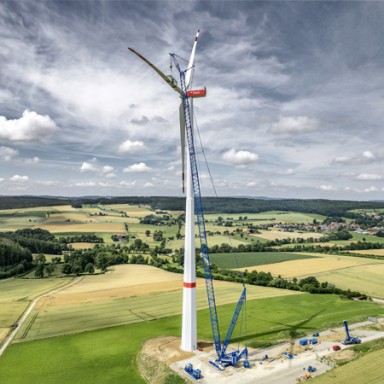Latest news
News and press releases
19/02/2026Press releases
Liebherr supports construction of the Cascata D`Otro Mountain Lodge
The construction of the Cascata D’Otro Mountain Lodge in Alagna Valsesia was successfully supported by a Liebherr 81 K.1 fast-erecting crane. The project combined high-quality tourism development with sensitive integration into the alpine landscape. Thanks to its rapid set-up and finely adjustable configurations, the Liebherr crane proved to be the ideal solution for the logistical challenges of building in a narrow mountain valley.
Find out more18/02/2026Press releases
Mathieu SA: Over 30 years of partnership with Liebherr
For more than three decades, the Belgian family-run company Mathieu SA has been working with Liebherr and its local sales partner, SOMTP, in the construction and quarrying sector. The long-standing partnership is built on high-performance machines and reliable, customer-focussed support – two key factors that have helped shape the company's long-term success.
Find out more18/02/2026Press releases
Liebherr awarded BOS 45000 heavy-lift offshore crane project in South Korea
The new Liebherr BOS 45000 crane has been acquired by Eunsung O&C Co., Ltd., founded in 1989. The company is known for its expertise in ground improvement, foundation engineering and complex onshore and offshore infrastructure projects. The BOS 45000 will equip a jack-up barge that will install offshore wind turbines and carry out maintenance work in Asian waters.
Find out more18/02/2026Press releases
Crane package for Imetame: Four Liebherr mobile cranes for major project in the pulp industry
The Brazilian Imetame Group has added four Liebherr mobile cranes to its vehicle fleet, consisting of LTM 1090 4.2, LTM 1120 4.1, LTM 1250 5.1 and LTM 1230 5.1 models and is thereby increasing its capacities for sophisticated industrial operations. The powerful cranes, which impress with their high lifting capacity, operational safety and efficiency, will play a key role in a large pulp and paper project in the Brazilian state of Mato Grosso do Sul.
Find out more16/02/2026Press releases
Liebherr drives forward sustainable energy and infrastructure solutions for construction sites
With the foundation of Liebherr Energy Solutions GmbH, Liebherr expands its portfolio in the field of digitalisation and sustainable energy management. The company combines the existing core competencies in energy storage technologies, as well as energy planning software. The innovative portfolio is designed to further reduce energy consumption and CO₂ emissions on construction sites and to promote the electrification of construction and commercial vehicles.
Find out more
Magazines by Liebherr
Exhibitions and events
22/02/2026 - 25/02/2026Exhibitions
SME Mine Exchange Annual Conference
smeannualconference.org/22/02/2026 - 26/02/2026Exhibitions
www.euroshop.de/18/03/2026 - 19/03/2026Exhibitions
Ausbildungs- und Studienmesse TOPJob
www.ehingen.de/wirtschaft-standort/default-053b0c3f0e18/03/2026 - 19/03/2026Exhibitions
www.solids-dortmund.de17/04/2026Exhibitions
www.future4you-bc.de/365t
Continue reading

Our year in figures
Published every year, our Annual Report looks back in detail at the past financial year. Find out facts, figures and stories from the Group.

Shaping digital transformation
Whether it is IoT, machine learning or cloud applications – discover Liebherr’s wide range of digital solutions.

All about wind energy
As a strong partner to the wind industry, Liebherr offers the right solution for a wide range of requirements.

Social Media
Find your community among Liebherr's many social media channels.